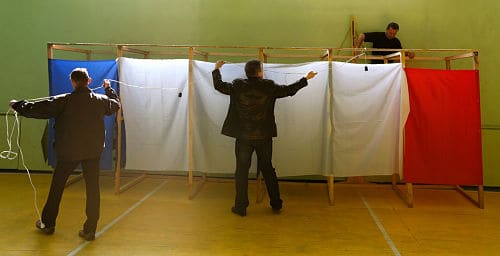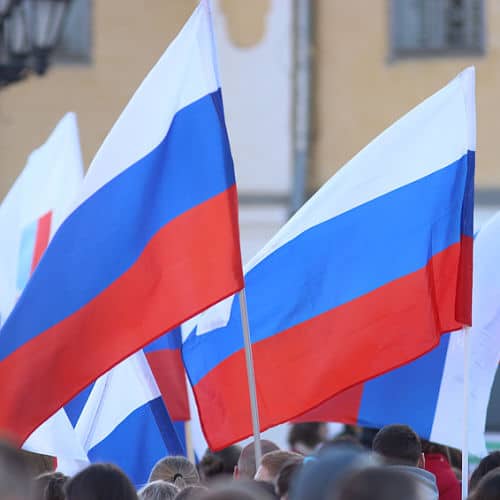Today we re-post our conversation with Judith Beyer from a joint virtual roundtable with Anthropoliteia. In her commentary, Judith answers the question: “What has struck you the most, or been most noteworthy, about the developments in Ukraine—from EuroMaidan to Crimea—so far?”
SIMULACRUM CRIMEA
By Judith Beyer
What I find fascinating about the specific way in which Crimea was annexed is the eloquence with which (pro-) Russian key actors engage in ‘legal talk’ and their devotion to uphold ‘legal form’ while simply ignoring all laws they do not like. On March 16, the citizens of Crimea were given two options in a referendum: either return ‘home’ to Russia or reinstate the 1992 constitution of Crimea giving the peninsula greater autonomy from Ukraine – including, for example, the right to secede and join another state. There was no option offered to vote for keeping things the way they were. Two days later, President Putin stated in a speech in front of the Russian parliament that the event was “in full compliance with democratic procedures and international norms”. He then put forward a request for consideration of a constitutional amendment endorsing the creation of two new constituent entities within the Russian Federation: the Republic of Crimea and the city of Sevastopol, “in accordance with the people’s will”.
There is no doubt that the referendum was unconstitutional according to Art. 73 of the Ukrainian constitution, but was it a “sham display of democracy”, as Ian Berill called it in his article? I argue that what we are witnessing in the case of Crimea is not so much sham, defined as “a thing that is not what it purports to be”, thus a simulation, but a simulacrum – something that can no longer be measured against an “authentic” original (Baudrillard/Deleuze). Instead of trying to assess the situation in Ukraine in reference to idealized notions of ‘democracy’ and ‘rule of law’, we are better served by looking at the recent events in Crimea as performances. It is through the staging of political and legal performances that (pro-) Russian actors tap into discourses and concepts often considered to be accomplishments of ‘Western civilization’, and hallmarks of Western discourse, redefining them as they go along. All the while, these actors, especially Putin himself, are holding these discourses and concepts up as a mirror to those criticizing their actions. In his March 18 address, Putin asked mockingly: “What do we hear from our colleagues in Western Europe and North America? They say we are violating norms of international law. Firstly, it’s a good thing that they at least remember that there exists such a thing as international law – better late than never.”
By holding up this mirror, Putin effectively forces the West into the role of being the audience of its own performances, of reflecting its own attitudes. This turns our attention to the question of the intended audiences of political action. In a general sense, anthropologist Richard Bauman defined performances as “actions undertaken by someone for someone”, creating “a consciousness of consciousness” (1989:48). For sociologist Erving Goffmann, the audience was equally central to the concept of performance, which he defined as “all the activity of an individual which occurs during a period marked by his continuous presence before a particular set of observers…” (1959:1).
There were several ‘observers’ present during the referendum: first of all, the citizens of Crimea. Those who decided to vote did so in polling booths with curtains arranged in the colors of the Russian flag, while melodramatic Soviet music was being played in the background. Outside the polling stations, a second group of ‘observers’ patrolled public places: around 12,000 soldiers of a “self-defense force” – as Putin labeled the military personnel that had entered Crimea in the preceding days – who joined pro-Russian camouflaged “illegal forces”, in the terminology of Human Rights Watch. A third group were the ‘international observers’ recruited by a Brussels-based NGO called Eurasian Observatory for Democracy & Election who had invited mostly dubious left- and right-wing politicians from Russia and the EU to monitor the referendum. The OSCE had also received an invitation, but did not send observers, as it does not recognize Crimea as a sovereign state. A fourth group were journalists from Russian state media networks writing in English for an overseas audience, who claimed that 97% of Crimeans voted to join Russia, thereby countering reports from British or American news outlets, for example The Guardian or Al Jazeera America.

Within hours after the ballots had been counted, Russian flags were raised over public office buildings, the letters on the building of the Crimean parliament were dismantled, and the Russian army began to take over all Ukrainian military posts on the peninsula. On March 19, Russia began handing out passports to its new citizens. On March 21, it was announced that the Crimean ‘self-defense forces’ would enter the ranks of the Russian military. These symbolic measures served to emphasize the transfer of state power to Russia. Russia, one could argue, arranged for the necessary ‘raw material’ needed for a referendum – citizens, comrades, commentators and critics – and then leaned back and watched as the play unfolded. After it had accepted the referendum and thus validated the performances in Crimea, it changed its own constitution (Art. 65, I), thereby finalizing the annexation, again via legal means.
International law might be “just paper that has lost its value long ago”, as Alexei Malashenko from the Moscow Carnegie Center claimed in light of these events, but ‘legal form’ and ‘legal talk’ continue to be key in the way politics are performed in Russia. When on March 28, the UN General Assembly voted to declare the annexation of Crimea ‘illegal’, Russia called the decision “counterproductive”, this time pointing the mirror at the Ukrainian interim government. In performance studies, it is assumed that if a performance does not match accepted conventional procedure or appropriate circumstances, it will not be ‘successful’. Russia’s choice of vocabulary becomes understandable when one takes into account that for the simulacrum that is the situation in Crimea ‘illegality’ has no semantic place since references and adherence to law(s) are arbitrary on all sides. To call something ‘illegal’ is therefore to miss the point; rather, what has occurred is a failure to recognize that there is no safe place from which we could passively ‘observe’ – and judge – the on-going performances on all sides.





It is incorrect to say that “‘illegality’ has no semantic place.” It at least has a place as part of a counter-performance. Moreover, I don’t think that it is problematic to point out that the procedures followed violated international norms. As you say, there was no option for keeping things the same on the ballot. The fact that “we” in the West also violate laws does not mean that there is no such thing as illegality anymore, just that illegality is rampant.